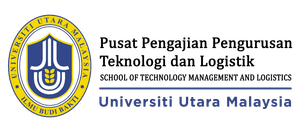A PRELIMINARY STUDY OF HALAL LOGISTICS ISSUES AMONG FOOD MANUFACTURING COMPANIES
DOI:
https://doi.org/10.32890/jtom2016.11.1.2Keywords:
Food, halal, logistics, supplyAbstract
This paper is presenting some issues encountered on halal logistics mainly for food products as to ensure the integrity status along the supply-chain network. Since halal is applicable for the Muslim and also to the non-Muslim, it makes it imperative that halal products were recognized and known globally especially for health, safety and hygiene. With a view of that, a study on halal logistics is extremely important in ensuring the concept of halal is not only applicable for preparation of food, but also the process of managing its storage, handling of raw materials, procurement, and transport. Those processes include all types of food throughout the supply-chain network with a compliance with the Shariah principles. The method used for the study is coming from a qualitative approach involving a series of interviews and supported by secondary data. The results from the study would contribute some of the novel findings in the halal logistics areas as well as suggestions for the future studies. The results were also recommended to be further discussed for the benefits and future practices of halal logistics companies in understanding the halal concept.
Metrics
References
Aziz, Y. A., & Chok, N. V. (2012). The role of halal awareness, halal certification, and marketing components in determining halal purchase intention among non-Muslims in Malaysia: A structural equation modelling approach. Journal of International Food & Agribusiness Marketing, 25 (1), pp. 1-23.
Aziz, Y. A., & Chok, N. V. (2013): The Role of Halal Awareness, Halal Certification, and Marketing Components in Determining Halal Purchase Intention Among Non-Muslims in Malaysia: A Structural Equation Modeling Approach, Journal of International Food & Agribusiness Marketing, 25:1, 1-23
Department of Islamic Development (JAKIM). (2015). JAKIM, Kuala Lumpur. Personal Interview. http://www.islam.gov.my.
Fischer, J. (2011). The Halal Frontier: Muslim Consumers in a Globalized Market, Contemporary Anthropology of Religion Series, Palgrave MacMillan.
Gayatri, G., & Chew, J. (2013). How do Muslim consumers perceive service quality? Asia Pacific Journal of Marketing and Logistics, 25 (3), pp. 472-490.
Halal Development Center, (HDC). (2015). Personal Interview. 22nd May 2015. Damansara Utama, Selangor.
Ibrahim H., Kamaruddin R., & Shabudin A. (2012). Halal Development System: The Institutional Framework, Issues and Challenges for Halal Logistics, IEEE Symposium on Business, Engineering and Industrial Applications.
Jaafar, H.S., (2011). Innovation in logistics services–halal logistics. The 16th International Symposium on Logistics. Berlin.
Kamaruddin, R., Iberahim, H., & Shabudin, A. (2012). Willingness to pay for halal logistics: The lifestyle choice. Procedia-Social and Behavioral Sciences, 50, pp. 722-729.
Kearney, A.T. (2010). (Accessed 14 December 2012). Addressing the Muslim Market. Can You Afford Not To?
http://imaratconsultants.com/wp-content/uploads/2012/10/Addressing-Muslim-Market.pdf
Lever, John & Miele, M. (2012) .The growth of halal meat markets in Europe: an exploration of the supply side theory of religion, in Journal of Rural Studies, 28 (4), pp. 528-537
Malaysia Demographics Profile (Index Mundi) 2014.
http://www.indexmundi.com/malaysia/demographics_profile.html.
Malaysian Standard, (2004). MS1500:2004 Halal Food-Production, Preparation,Handling and Storage-General Guidelines. First Revision. Department Of Standards Malaysia.
Marzuki, S. Z. S., Hall, C. M., & Ballantine, P. W. (2012). Restaurant manager and halal certification in Malaysia. Journal of Foodservice Business Research, 15 (2), pp. 195-214.
Mohamad, M. H. (2013). The Prospect of Halal Concept for Muslim Manufacturers, Institute of Islamic Understanding Malaysia, IKIM.
Papadopoulos, D., Stephenson, N., & Tsianos, V. (2008). Escape Routes: Control and Subversion in the 21st Century, Pluto Press.
Pew Forum. (2011). The Future of the Global Muslim Population: Projections for 2010-2030. http://pewforum.org/The-Future-of-the-Global-Muslim-Population.aspx
Port Klang Free Zone, PKFZ. (2015). Personal Interview. 19 May 2015. Pulau Indah, Selangor.
Talib, M. S. A., Rubin, L., Zhengyi, V.K. (2013). Qualitative Research on Critical Issues in Halal Logistics. Journal of Emerging Economies and Islamic Research, Vol 1, No 2, pp. 40-120.
Talib, M. S. A., & Hamid A. B. A. (2014). "Halal logistics in Malaysia: a SWOT analysis. Journal of Islamic Marketing. Vol. 5, No. 3, pp. 322-343.
Talib, M. S. A., Hamid A. B. A., Zulfakar M. H. & Jeeva A. S. (2014). Halal Logistics PEST Analysis: The Malaysia Perspectives. Canadian Centre of Science and Education, Vol. 10, No. 14.
Talib, M. S. A., Hamid A. B. A., Zulfakar M. H. & Chin T.A. (2015). Barriers to Halal logistics operations: views of Malaysian logistics experts. International Journal of Logistics Systems and Management, 22 (2), pp. 193-209.
Tieman, M., van der Vorst, J. G., & Ghazali, M. C. (2012). Principles of halal supply chain management. Journal of Islamic Marketing, 3 (3), pp. 217-243.
Tieman M., Ghazali, M. C. , Van der Vorst, J. G. (2013). "Consumer perception on halal meat logistics," British Food Journal, Vol. 115 Issue: 8, pp. 1112 – 1129.
Tieman, M. (2013). Establishing the principles in halal logistics. Journal of Emerging Economies and Islamic Research (JEEIR), 1 (1), pp. 1-13.
Tieman, M. (2015). Halal Certification Procedures: Some Unresolved Issues 2015, Islam and civilizational renewal (ICR), Vol 6, Issue 1.
Zulfakar, M. H., Jie, F. & Chan, C. (2012). Halal food supply chain integrity: from a literature review to a conceptual framework. In 10th ANZAM Operations, Supply Chain and Services Management Symposium. Melbourne, Australia. 14-15th June 2012.
Downloads
Published
How to Cite
Issue
Section
License
Disclaimer
The Journal of Technology and Operation Management (JTOM) has taken all reasonable measures to ensure that material contained in this website is the original work of the author(s). However, the Journal gives no warranty and accepts no responsibility for the accuracy or the completeness of the material; no reliance should be made by any user on the material. The user should check with the authors for confirmation. Articles published in the Journal of Technology and Operation Management (JTOM) do not represent the views held by the editors and members of the editorial board. Authors are responsible for all aspects of their articles except the editorial screen design.














